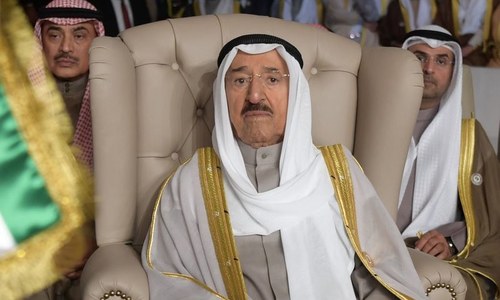Kuwait's new ruler in waiting may find it harder than his predecessor to uphold his country's mediating role between rival Gulf powers, if only because he lacks his late brother's decades of experience as a conciliator in a polarised region.
Sheikh Nawaf al-Ahmad al-Sabah, named crown prince of the oil-producing country in 2006, is in line to succeed his brother Emir Sheikh Sabah al-Ahmad, whose death was announced on Tuesday.
Under Nawaf, 83, Kuwait is likely to continue to work for stability by staying on good terms with its often quarrelling, powerful neighbours, instead of seeking a leadership role in the region, diplomats say.
But he lacks the negotiating skills of the late emir, who spent four decades as Kuwait's top diplomat, earning the respect of his neighbours for rebuilding ties in the Middle East after Iraq's 1990 invasion of his small but hugely wealthy country.
Swathes of the region remain mired in conflict and strife.
Saudi Arabia and Iran are locked in proxy wars across the region. US-Iranian animosity reached historic heights in January when the United States killed top Iranian military commander Qassem Soleimani in a drone strike in Baghdad.
Sheikh Sabah tried until his death to end a Gulf row that has seen Riyadh and its allies boycott Qatar since mid-2017.
While foreign policy is unlikely to change under Nawaf, OPEC member Kuwait may lose gravitas internationally, two sources close to the ruling family and one of the diplomats said.
“He doesn't have the experience, the willingness for foreign policy,” one of two sources said. “Inside, Kuwait will stay strong, but outside it will be weaker.”
Sheikh Nawaf largely kept a low profile as crown prince and also during previous roles as defence minister, at the time of the 1990 invasion, and interior minister. He is known as a founder of the country's national guard and has attempted to build security cooperation with Arab states.
He had been widely perceived as a surprise choice by the emir in the succession line in 2006, and a reluctant ruler, who was encouraged to accept the role by senior members of the 250-year-old Al Sabah dynasty, said the diplomat.
Royal jostling
Diplomats and analysts expect he will delegate a larger portion of state affairs to his crown prince because of his low-key style and his age. This means that the person nominated by family consensus as his heir, a post which normally also holds the post of prime minister, will be closely watched.
Dozens of senior Al Sabah family members have been jostling for position in anticipation of the choice of crown prince, a role that traditionally manages the government's often difficult relationship with parliament.
A handful of unofficial potential candidates include the late emir's 72-year-old eldest son, Sheikh Nasser Sabah al-Ahmad al-Sabah, according to the sources close to the ruling family and diplomats.
Business-minded Nasser entered the senior ranks of the cabinet in 2017 as defence minister but lost the job last year after the government quit in a row with the country's influential elected parliament and amid royal infighting.
Another candidate is former prime minister Sheikh Nasser al-Mohammad al-Sabah, a nephew of the emir who stepped down in 2011 after lawmakers threatened to question him on corruption allegations, but had remained close to the emir.
Sheikh Meshal al-Ahmad al-Jaber al-Sabah, deputy chief of the National Guard, could also be in the running.
None of the men — the crown prince and his potential successors — have the diplomatic experience of the emir.
Maintaining balance
Any potential successor will have to act swiftly to tackle domestic issues after their ascension, such as the government's often fractious ties with parliament and jostling within the ranks of the Al Sabah, leaving less time for foreign policy.
Kuwait's government is seeking to shore up its finances amid low oil prices and the coronavirus pandemic, while depleting its General Reserve Fund to plug a budget deficit.
Waiting in the wings is a new generation of royals: senior royal court official Sheikh Mohammad al-Mubarak al-Sabah and international sports figure Sheikh Ahmad al-Fahad al-Sabah, who had been sidelined over allegations of political meddling in the royal system and corruption, which he denies.
Kuwait has the most open political system in the Gulf, with parliament wielding power to pass laws and question ministers, although most senior posts are occupied by Al Sabah members.
Friction between the cabinet and the assembly has led to frequent reshuffles or dissolution of parliament, holding up crucial investment and economic reforms.
Sheikh Nawaf's discreet manner and openness to different points of view will be essential for maintaining balance, diplomats say, adding he could give more space for lawmakers to question senior ministers and allow some top cabinet posts to be held by people outside the Sabah family.














































